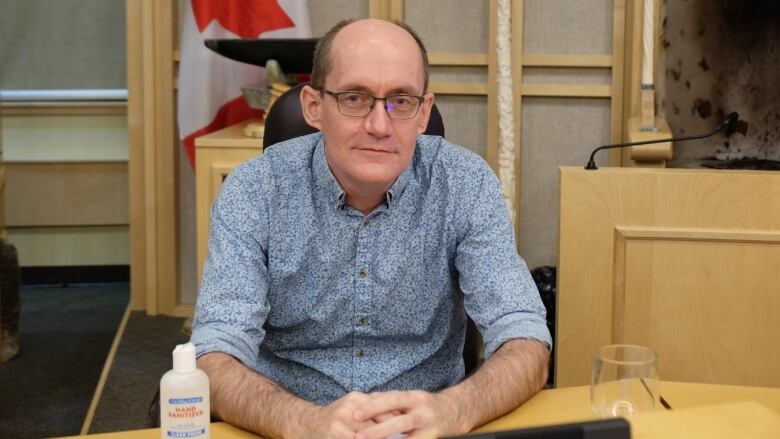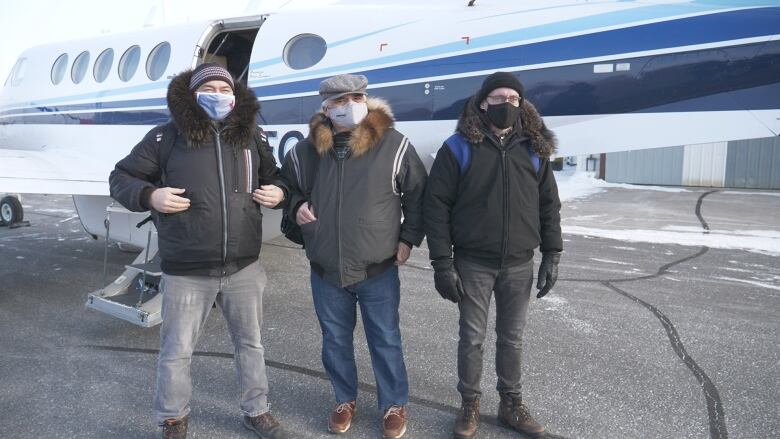Nunavut promised enough vaccines for 85 per cent of adult population
Nunavut had 33 active cases of COVID-19 as of Wednesday

The territory continues to have33 active cases Wednesday, with one new case announced in Iqaluit Wednesday morning and one recovery.
Most people are considered recovered 10 days after the onset of symptoms, or for asymptomatic people, 10 days from their positive test. They are also required to be symptom-free for at least 24 hours to be considered recovered.
Chief Public Health Officer Dr. Michael Patterson said at a press conference Wednesday that there have been a lot of questions about testing, and asked anyone with concerns about exposure or symptoms to call the COVID-19 hotline.
The symptoms for COVID-19 can include sore throat, runny nose, new or worsening cough, shortness of breath, loss of appetite, upset stomach, loss of taste or smell, muscle aches and tiredness, Patterson said.
Iqaluit is holding steady at about 66 high risk contacts to the city's positive cases, however, he says there have been several more low-risk contacts. There were no updated tests numbers in Iqaluit from the 263 tests announced earlier this week.
When someone is identified as a contact, public health will reach out either over the phone or in person to give details about their potential exposure and go over the isolation requirements.
Based on their symptoms and the timing of their exposure, public health will make a decision about whether or not to test the contact. Health staff will continue to follow up with those individuals as necessary.

Officials confirmed that the two COVID-19 cases in Kinngait, Nunavut, were linked to the Iqaluit outbreak on Tuesday, through a family member in Iqaluit.
Nunavut promised vaccines for 85 per cent of adults
Nunavut has been promised more of the Moderna vaccine over the next few months, Patterson said. It's expecting shipments that will cover rotational workers coming into the territory, as well as enough to bump Nunavut's adult population to 85 per cent vaccinated.
Previous commitments from the federal government promised enough vaccines to vaccinate 75 per cent of adults in Nunavut, which is around 19,000 people.
So far, there are no plans for Nunavummiut to receive any vaccine other than Moderna.
Doses of the vaccine are still available in all communities, Patterson said.
Arviat can plan for eased restrictions
On Tuesday, Arviat's outbreak was officially over, Patterson said if there are no changes to the situation in the community, it can expect restrictions to ease on Monday.
This change will bring Arviat in line with restrictions across the Kivalliq, with the exception of Rankin Inlet. All businesses and schools can open and outdoor gatherings will be allowed up to 100 people and household gatherings will be restricted to household members,plus 15 people.
Masks continue to be strongly recommended and physically distancing required in public spaces.
Public buildings are allowed to open at 75 per cent capacity or 100 people, whichever is fewer.
Miss the press conference? Watch it here:
Patterson said in a news conference on Tuesday that COVID-19 numbers are expected to rise in Iqaluit as public health has confirmed some people contracted COVID-19 from visiting the Storehouse Bar and Grill.
"We know there's a number of people who've contracted COVID-19 in at least one of the bars in town, so there may be other people as well," Patterson said.
It's too soon to tell if the virus is contained in Kinngait, Patterson said. So far seven contacts have been identified in the community.
As a result of the spread to a second community in the Qikiqtaaluk, restrictions were tightened yesterday across the region and in Rankin Inlet.
Gathering restrictions stayed the same in Rankin Inlet, but masks were made mandatory.
The dog sled race Nunavut Quest plans to go ahead in Arctic Bay with some changes to follow public health measures. Patterson said he strongly recommends against all events that require travel and larger gatherings.
However, he said if it goes ahead they must follow the gathering limits dictated by public health and masks are mandatory.
In the Qikiqtaaluk, schools entered stage three of Nunavut's COVID-19 education plan, which means all grades are only attending school in personpart-time and schedules are staggered.
Schools will remain fully closed for at least the rest of the week in Iqaluit and Kinngait.












_(720p).jpg)


 OFFICIAL HD MUSIC VIDEO.jpg)
.jpg)



























































































